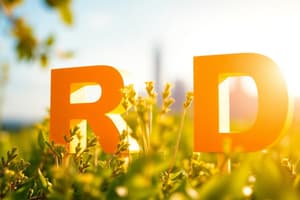Podcast
Questions and Answers
What does OECD stand for?
What does OECD stand for?
Organisation for Economic Co-operation and Development
The OECD was founded in 1961.
The OECD was founded in 1961.
True
What is the role of the OECD? (Select all that apply)
What is the role of the OECD? (Select all that apply)
What is the official language of OPEC?
What is the official language of OPEC?
Signup and view all the answers
Which of these countries is NOT a member of OPEC?
Which of these countries is NOT a member of OPEC?
Signup and view all the answers
The European Union was established in 1993.
The European Union was established in 1993.
Signup and view all the answers
What does the acronym "Brexit" stand for?
What does the acronym "Brexit" stand for?
Signup and view all the answers
Which of these is NOT a Key Fact about the European Union?
Which of these is NOT a Key Fact about the European Union?
Signup and view all the answers
Study Notes
OECD
- International organization promoting policies improving economic and social well-being worldwide
- Founded in 1961, with 38 member countries (mostly high-income)
- Focus areas include: economic policy, education, employment, environment, innovation, and trade
OECD Roles
- Policy Development: Shapes policies affecting global economic growth, trade, etc. and provides evidence-based recommendations for governments.
- Data and Research: Collects and analyzes global economic and social data, providing reliable statistics and reports for informed decision-making.
- Global Standards: Sets international standards for taxation, corporate governance, and environmental practices to harmonize policies across countries for effective global governance.
- Promoting Sustainable Growth: Focuses on inequality, environmental sustainability, and digital transformation to support countries transitioning to a greener and more inclusive future.
- Fostering International Collaboration: Serves as a platform for dialogue and cooperation, facilitating the exchange of practices
- Monitoring and Accountability: Conducts peer reviews and requires regular reports from member countries to ensure progress is monitored.
OPEC
- Intergovernmental organization coordinating and unifying petroleum policies of member countries to stabilize oil prices.
- Founded in September 1960 in Baghdad, Iraq, by five countries (Iran, Iraq, Kuwait, Saudi Arabia, Venezuela)
- 13 member countries
- Located in Vienna, Austria
- Official language: English
- Aims include:
- Coordinating and unifying petroleum policies of members
- Stabilizing oil prices
- Ensuring regular supply to petroleum consumers
- Providing a fair return on capital for those investing
European Union
- Political and economic union of 27 European countries
- Bound by shared laws, policies, and goals to promote economic cooperation, stability, and peace within Europe
- Established in 1993
- The United Kingdom left in 2020
- Key Institutions:
- European Commission: Proposes and enforces laws
- European Council: Consists of heads of state/government; sets EU's political agenda
- European Parliament: Directly elected by EU citizens; participates in law-making process
- Court of Justice of the European Union: Interprets and applies EU law uniformly across member states
- Key facts and achievements:
- Single market and customs union
- Eurozone
- Peace and stability
- Human rights and democracy
- Environmental protection
- Consumer protection and trade
Reasons for UK leaving EU (Brexit)
- Desired reforms within the European Union
- Concerns about immigration and EU membership linkages
- Emphasis on sovereignty and anti-establishment politics
Studying That Suits You
Use AI to generate personalized quizzes and flashcards to suit your learning preferences.
Related Documents
Description
This quiz explores the OECD's role in shaping global economic and social policies. Learn about its founding, focus areas, and how it promotes sustainable growth and international standards. Test your knowledge of this influential organization's impact on worldwide governance.





